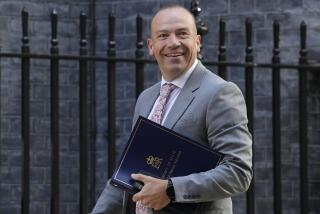British Taxpayers Footing Bill for Northern Ireland’s Civil Conflict
- Share via
BELFAST, Northern Ireland — After a summer of riots and destruction, the people of Northern Ireland are picking up the pieces--and British taxpayers are picking up the check.
Some people are wondering whether the government, by covering the tab for Northern Ireland’s “troubles,” actually helps keep them going at a perversely acceptable level.
Since the Irish Republican Army began trying to bomb the heart out of Northern Ireland in the early 1970s as part of its campaign against British rule, the government has countered by insuring almost everything against terrorism, riots and thuggery.
It has paid out more than $1.2 billion to businesses, homeowners and motorists, accounting for a critical chunk of economic activity in this land of 900,000 Protestants and 650,000 Roman Catholics.
The peace process had promised to cut this bill. But then the collision of Protestant marchers, Catholic protesters and riot police in July caused more than $30 million in wrecked property.
Critics say the government’s offer to reimburse all damage exceeding $300 per claim makes Northern Ireland residents less likely to move from hard-line positions that underpin the conflict. But they see no moral alternative.
“It is perverse, but nonetheless true, that the government’s compensation scheme has provided a big cushion against the realities of the Northern Ireland situation,” said Eddie Moxon-Browne, a longtime Belfast resident and director of the peace studies program at the University of Limerick in southwestern Ireland.
That cushion, and a heavy security presence of one soldier or police officer for every 50 residents, condition people to the idea that Northern Ireland may periodically blow up but never really spiral into a full-fledged civil war.
“The fact that the British army is in Northern Ireland in such numbers holds the ring between the two communities and it always has done,” Moxon-Browne said.
“Some say, ‘Why not withdraw and let the two fight it out?’ That would allow the long-predicted, never-realized civil war to take place--and, maybe, a peace settlement would come in its bloody wake as happened in Bosnia.”
The British government took over primary responsibility for compensating victims of Northern Ireland’s violence in 1977, after private insurers increasingly refused to bear the risk.
Professor Desmond Greer, an expert in British compensation law at Queen’s University of Belfast, says this makes Northern Ireland unique among the world’s conflict zones.
“The scheme really is part of the way in which the United Kingdom government supports Northern Ireland economically,” said Greer, noting that the province produces about $7.5 billion in tax revenue annually but gets $12 billion in support.
“The money paid out in compensation is huge by Northern Ireland standards, and pocket money by English standards,” he said. “Presumably it enables businesses to come back again and again no matter what the IRA does. It’s clearly had a major impact.”
Without compensation, many people would be reluctant to buy new cars, but Northern Ireland has more new cars per capita than anywhere else in Britain or Ireland. Developers of Belfast’s new $50-million concert hall, riverside Hilton hotel and assorted suburban supermarkets now under construction probably would never have started.
David Robinson, a loan adjuster contracted by the government to assess claims since the early 1970s, has little time for the argument that the system contributes to Northern Ireland’s inflexible politics.
“At the end of the day, people see me as the person with the checkbook,” he said. “The system keeps this whole society from collapsing. It makes things better, not worse.”
Along north Belfast’s Shore Road, Robinson stopped to read the ruins: a Protestant church hall, a Catholic priest’s home and a Catholic primary school, all firebombed; a gas station ransacked by rioters; a Catholic senior citizen’s house with smashed windows.
Many victims say the compensation system cannot repair the most important damage--to community relations.
“We’ve got to get this play group back open, but they say the work will take six, seven months,” said the Rev. Mark Templeton, whose Congregational church in a religiously polarized part of north Belfast was firebombed July 11.
Robinson said the government was certain to pay for reconstruction, but Templeton might be stuck with the bill if he rented a mobile building before then.
“Besides the things we’ve lost that we can’t replace, like some 100-year-old Bibles, the fact is our kids will now go to other Protestants-only or Catholics-only play groups,” Templeton said. “We were doing some good, but that’s been stopped in its tracks now.”
More to Read
Sign up for Essential California
The most important California stories and recommendations in your inbox every morning.
You may occasionally receive promotional content from the Los Angeles Times.













